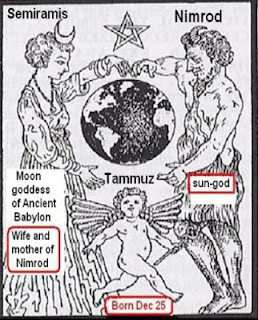As I was reading my devotions this morning I came to 1 Chronicles 1 and 2 which lists the general genealogy of the the children of Israel. In 1 Chronicles 1:10, Nimrod is listed once again for the third of four times in the Scriptures. But as I read his name it hit me that some ignorantly place history equal to Scripture and not even realize they are doing it. Let me explain.
My father was a preacher for over 50 years and was an ardent defender of salvation by grace and an equally strong attacker of Catholic “church doctrine.” He was a historian of sorts and would often meld historical events into his sermons, and I guess I do the same today to a lesser degree. But of all the historical things that my father preached about, there was none more compelling and nor more frequent than the history of the Catholic church. But I must add that he was not alone in this endeavor either, as many preachers down through my lifetime have done the same thing.
What does that have to do with Nimrod and placing history on the same level with Scripture?
According to many preachers, including my father, Nimrod was actually the beginning of the Catholic religion as his wife Semiramus and their son Tammuz began the first mother-child religion, which would later be melded into the Christian religion by Constantine as the Roman Catholic church. I myself have on more than one occasion shared that tidbit of historical data and so I am not disputing it at all. I believe these vents are historically accurate but this morning it hit me that we may have a problem with our usage of things.
As I read again the name of Nimrod this morning, my heart was convicted about the fact that sometimes I have used historical events as if they were hard and true facts almost equal to God’s Word, especially when they supported my views such as standing against Catholic heresy. You see, there is no where in Scripture that Nimrod, Semiramus, Tammuz, Constantine, or even the Catholic “church” are mentioned in connection with each other or even mentioned at all for that fact. You will not find Tammuz's birth, on supposed December 25, in any book of the Bible, yet many publicly assault Christians because of this event not based on Scripture itself. There is no mention of the melding together of their mother-child religion with Christianity....and thus we now have our problem. Why a problem? Because I, and many others, have shared these events AS FACT since they fit the narrative of our doctrine and not because they are in God’s Holy Word! Now mind you, I have NEVER said these events were in Scripture but when we represent them in the context of preaching some people will not know the difference.
Did these events happen? I believe they did. But should we preach them or teach them to our people as if they for sure happened? That is another subject to think about. The only book we should have absolute confidence in is the Word of God. It is the only book given by Inspiration and it is the only book where we can have full confidence to preach without reservation. We must not use history, no matter how compelling, to the same degree, such as preaching an entire message on the history of the Catholic church based upon something other than Scripture. This causes great confusion in some hearts and minds because they do not know where to draw the line between man’s fallible writings and God’s infallible Word.
By the way, this does not end with just the Catholic church history as many subjects are preached on without the benefit of full Scripture as foundational. What about exact style of music, exact level of modesty, or any other number of important subjects that we often preach upon ardently? We need to be honest enough to say that we are preaching based upon our personal application of principles and not a direct Scriptural mandate.
Would we not be better to say, “This is what history says” or “This is how I am applying these verses” and leave “Thus says the Lord” for those things which the Lord actually said? Would not the cause of Christ be better represented if we let people know that when we apply principles of Scripture they are NOT the same as the direct commands of God?

No comments:
Post a Comment